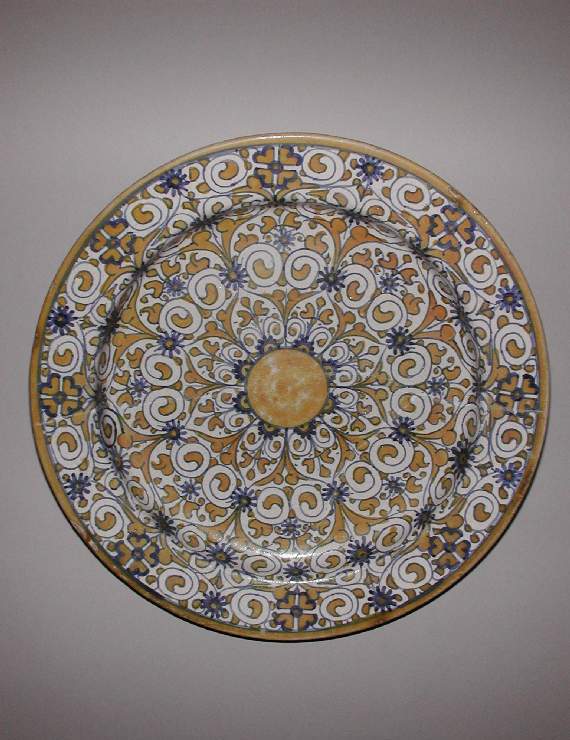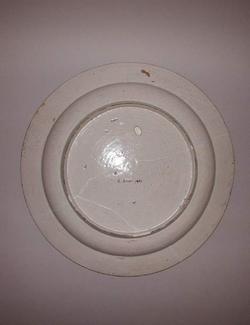Current Location: In storage
Maker(s)
Pottery:
Unidentified Deruta pottery
Entities
Categories
Description
Renaissance maiolica dish, painted in blue and with dull silver-yellow lustre with a repeating design of arabesques, scrolls and flowers.
Earthenware, tin-glazed overall, the reverse greyish, speckled and flawed. Painted in blue, and with dull silver-yellow lustre.
Shape approximately 63. Circular with narrow sloping rim, shallow sides and wide, flat centre, standing on the reverse greyish, speckled and flawed.
A repeating design of arabesques, scrolls, four-petalled and daisy flowers radiates from a central lustred disk. The rim is encircled by a blue band and a lustre band.
Notes
History note: Probably the `Deruta lustre plate c. 1550, conventional design' purchased from Battersby Art Co. on 14 June 1934 by H.S. Reitlinger (d.1950); the Reitlinger Trust, Maidenhead, from which transferred in 1991.
Legal notes
H.S. Reitlinger Bequest, 1950, transferred from the Reitlinger Trust, 1991
Measurements and weight
Diameter: 38.2 cm
Height: 5.8 cm
Acquisition and important dates
Method of acquisition: Bequeathed
(1991-04-29)
by
Reitlinger, Henry Scipio
Dating
16th Century, Mid
Renaissance
Circa
1530
-
1560
Note
Lustred arabesque patterns were probably derived from Valencian lustre ware. They appear in at least three different forms: most commonly as on this dish, with petals or arches formed by arabesques, scrolls, four-petalled and daisy-like flowers radiating from a central disk; a reticulated design without prominent scrolls, and with or without a central disk; and a less structured arrangement of lighter arabesques, foliate scrolls and flowers.
Maiolica decorated with these patterns has been attributed to Pesaro, as have other blue and silver-yellow lustrewares in the past, and there have been recent adherents to a Pesaro attribution for this group. A few sherds have been found with the remains of a kiln at Pesaro, but many more with similar decoration have been recovered at Deruta. The only dated example is a dish or cover of 1514, once in the Adda collection. It is therefore unlikely that the majority of this type was made by the Lanfranco workshop at Pesaro in the 1550s and 1560s, although attempts may have been made to imitate Deruta lustreware there. The form of this dish and its rather dull lustre probably indicate that was made nearer to 1550 than to 1515.
Comparable lustre designs appear on Deruta display dishes, large shallow dishes with narrow rims, and ewer basins. They also appear on closed forms, such as two-handled vases of two shapes, small jugs and ewers, and a standing bowl. All these forms are similar to those with other kinds of decoration attributed to Deruta, which strengthens the argument that this design, like others in blue and silver-yellow lustre, was executed there rther than at Pesaro.
School or Style
Renaissance
Components of the work
Decoration
composed of
high-temperature colour
( blue)
reduced pigment lustre
( silver-yellow)
Materials used in production
Tin-glaze
Earthenware
Techniques used in production
Tin-glazing
: Earthenware, tin-glazed overall, the reverse greyish, speckled and flawed. Painted in blue, and with dull silver-yellow lustre.
Inscription or legends present
Inscription present: oval with gold border
- Text: 42
- Method of creation: Inscribed in pencil
- Type: Label
References and bibliographic entries
Related exhibitions
Identification numbers
Accession number: C.200-1991
Primary reference Number: 48567
Packing number: ISCER 967
Stable URI
Audit data
Created: Saturday 6 August 2011
Updated: Wednesday 13 November 2024
Last processed: Wednesday 14 May 2025
Associated departments & institutions
Owner or interested party:
The Fitzwilliam Museum
Associated department:
Applied Arts





